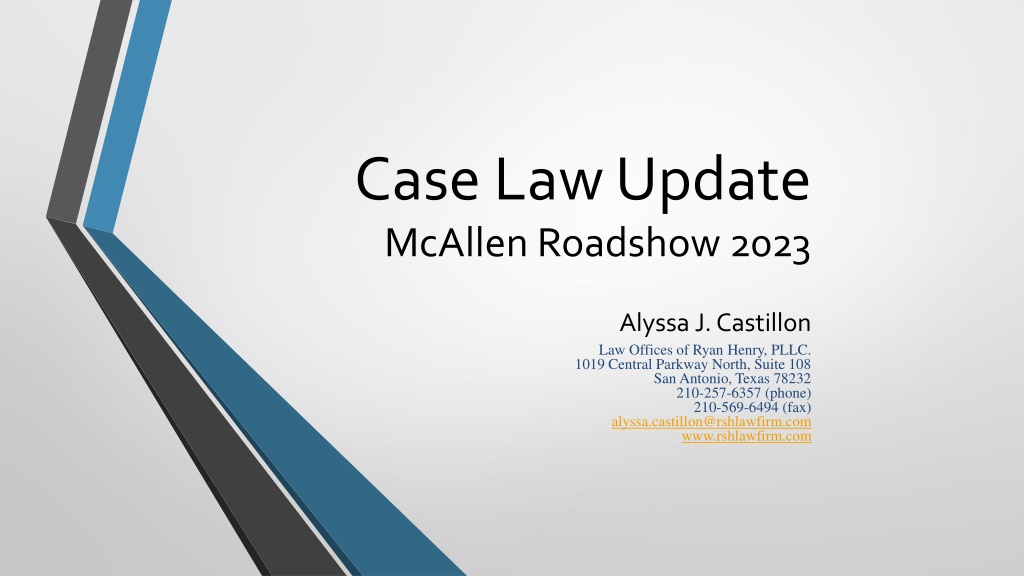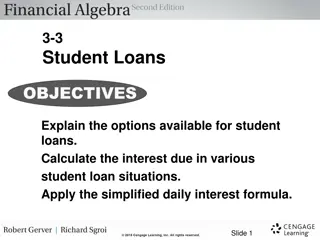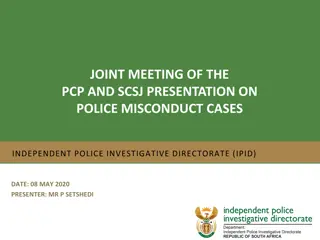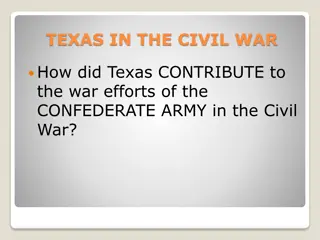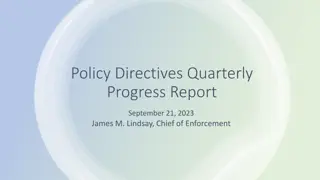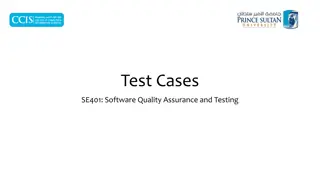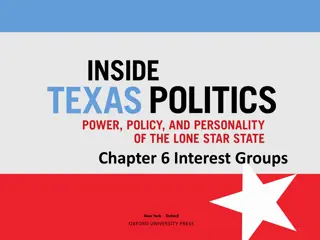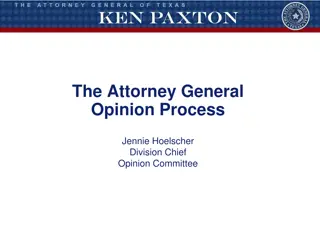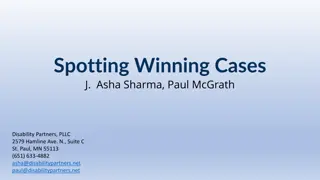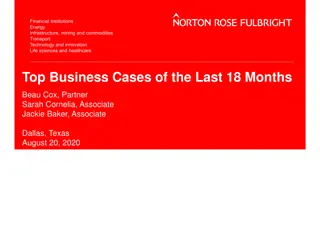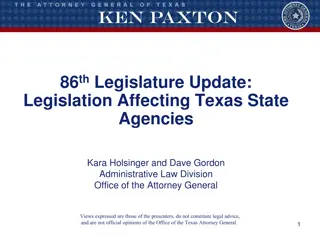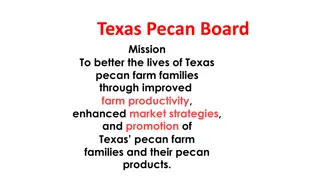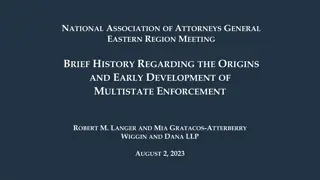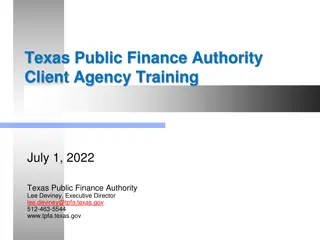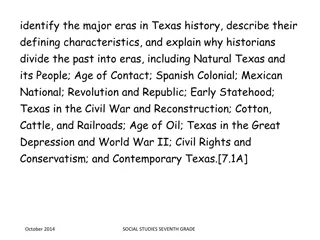Recent State Cases of Interest in Texas 2023
Case Law Update McAllen Roadshow 2023 presented by Alyssa J. Castillon Law Offices of Ryan Henry, PLLC featured insights on City of Austin v. Quinlan, VIA Metropolitan Transit Authority v. Flores, and Rattray v. City of Brownsville cases. The cases discuss liability, duty, and immunity of government entities in relation to premises defects, operations of motor-driven vehicles, and Texas Tort Claims Act implications.
Download Presentation

Please find below an Image/Link to download the presentation.
The content on the website is provided AS IS for your information and personal use only. It may not be sold, licensed, or shared on other websites without obtaining consent from the author.If you encounter any issues during the download, it is possible that the publisher has removed the file from their server.
You are allowed to download the files provided on this website for personal or commercial use, subject to the condition that they are used lawfully. All files are the property of their respective owners.
The content on the website is provided AS IS for your information and personal use only. It may not be sold, licensed, or shared on other websites without obtaining consent from the author.
E N D
Presentation Transcript
Case Law Update McAllen Roadshow 2023 Alyssa J. Castillon Law Offices of Ryan Henry, PLLC. 1019 Central Parkway North, Suite 108 San Antonio, Texas 78232 210-257-6357 (phone) 210-569-6494 (fax) alyssa.castillon@rshlawfirm.com www.rshlawfirm.com
Limited Scope Cases applicable to Government Attorneys Trying not to include cases potentially covered by other speakers Hitting the highlights 2023 Recent State Cases of Interest
City of Austin v. Quinlan, 669 S.W.3d 813 (Tex. 2023) Restaurant had: Permit to operate a sidewalk caf ; and Sidewalk Caf Maintenance Agreement with City stating restaurant responsible for maintaining from sidewalk to street. Plaintiff fell stepping from sidewalk and sued Restaurant and City Issue: whether City legally is obligated to ensure compliance with Agreement? Texas Supreme Court ruled: Contract allowed inspection/maintenance, but did not requireit = discretionary City has no legal duty (obligation) to ensure compliance with agreement the City s failure . . . to perform an act that [it] is not required by law to perform, does NOT waive immunity No waiver for negligent implementation of policy without more Restaurant failed to plead a claim that waives the City s immunity City is immune from liability for premise defect and its failure to ensure permit holder complied with maintenance obligations
VIA Metropolitan Transit Authority v. Flores, No. 04-21-00233-CV (Tex. App. San Antonio, August 3, 2022) Bus driver deployed wheelchair ramp and walked to back of bus to lift seats to make room for Plaintiff s wheelchair Plaintiff attempted to board, but mis-aligned the wheels with the ramp and fell Issue: Whether bus driver s acts were operation or use of motor-driven vehicle ? 4thCourt of Appeals held NO waiver of immunity: Under the ordinary, everyday meaning of the words operation and use, the deployment of a wheelchair ramp and preparation of the wheelchair-accessible area did NOT constitute actively helping Plaintiff board the bus. NO Nexus between Plaintiff s injury and Driver s operation or use of motor-driven vehicle Driver was unaware that Plaintiff had fallen until AFTER the fact and driver did not even have an opportunity to assist Plaintiff with boarding the bus. Discussion on what constitutes operation and use Operation of public bus wheelchair ramp does NOT waive immunity
Rattray, et. al, v. City of Brownsville, 662 S.W.3d 860 (Tex. 2023) (Mainly just helpful information even though City lost) Texas Supreme Court explains a Plaintiffs burdens to defeat a plea to the jurisdiction under Texas Tort Claims Act (TTCA) 11 homeowners sued for taking when City opened and closed certain drainage system gates which resulted in stormwater accumulation that allegedly flooded their homes The Court went through a detailed analysis of the burdens a plaintiff has when trying to defeat a plea to the jurisdiction (PTJ). The starting point is always the status quo: a presumption against any waiver Plaintiffs must establish a waiver and disprove withdraws of waiver of immunity TTCA also contains some provisions that operate to limit recovery (i.e., Punitive damages/caps) Plaintiffs must establish clearly and affirmatively a waiver of immunity and negateany provisions that create exceptions. A governmental defendant, in turn, plays its role by identifying where jurisdiction might be lacking and raising any such deficiencies. (PTJ)
Rattray Continued The rigor of proof required to satisfy a court that jurisdiction is present increases at each stage of litigation. The fundamental rule = the court may not reach the merits if it finds a single valid basis to defeat jurisdiction at each stage. (One is enough) Good discussion on operation , use , non-use , and causation In this case TX Supreme Ct held Plaintiffs defeated PTJ after analysis Gate was used to control water flow to the resaca City closed the gate to control flow and allegedly caused the flooding The gate was put to operation or use to create a fact issue on whether property damage arose from City s closure of that gate at that time = Waiver of immunity properly invoked The Court noted that the failure to close the gate would NOT be a waiver if another event had occurred the following day. The Court also cautioned that there was a fact issue on causation, and no finding that such acts will ultimately result in a waiver is pre-supposed.
City of Houston v. Arellano, 654 S.W.3d 483 (Tex. App. Houston [14th Dist.] 2022, pet. denied), reconsideration en banc denied (Oct. 25, 2022), reh g denied (Oct. 25, 2022) On-call maintenance worker clocked in remotely when notified of a city building without heat After picking up city vehicle, proceeded to building and collided with Plaintiff. Issue: whether City employee was in scope of employment or responding to an emergency when collision occurred? 14thCOA held: When an employee is driving a vehicle owned by the employer, the employee is under a presumption to be acting within the course and scope of their employment. City failed to refute presumption and a fact question exists on emergency Lack of heat = Testimony: emergency that needs to be addressed quickly, but not emergency like a fire truck responding to fire Material Fact Issue = Responding to emergency call OR reacting to emergency? City s MSJ/PTJ denied Fact questions on emergency prevented Plea to Jurisdiction
Gulf Coast Center v. Curry, 658 S.W.3d 281 (Tex. 2022) Gulf Coast contends it is a community center established under Chapter 534 of the Health and Safety Code and possesses governmental immunity. Plaintiff was crossing the street when he was hit by a bus driven by a GC employee. Jury awarded $216,000. GC asserted $100,000 cap as a govt entity. Trial court awarded jury award noting GC failed to raise the cap as an affirmative defense. GC asserted cap is jurisdictional and had provided proof of status as community center (govt entity). Issue: whether caps conscribe trial court to render judgment exceeding the cap or are an affirmative defense that must be pleaded and proven by the govt defendant? TX Supreme Court held: GC was a unit of local govt subject to the $100K damages cap under TTCA 101.025 states that immunity from suit is waived to the extent of liability created by the TTCA. Thus, waiver of immunity is limited to the extent of recoverable damages under the applicable cap. 101.023 s limitations of liability are NOT an affirmative defense but do implicate jurisdiction. Plaintiff has the burden to establish which cap applies. Because it s a jurisdictional issue -Court makes the decision, not the jury. Courts lack jurisdiction to render a judgment that exceeds the applicable damages cap TTCA cap on damages are jurisdictional and it is Plaintiff s burden to establish which cap applies.
Leach v. City of Tyler, 653 S.W.3d 723 (Tex. 2022), per curiam Plaintiff, while working for his employer, was injured when lumber fell from a city truck and struck him in the head EMPLOYER filed the Notice of Claim; the Plaintiff did not BUT Plaintiff was repeatedly listed on the employer s notice. City s PTJ claimed no notice from Plaintiff as the claimant and asserted lack of jurisdiction Issue: whether notice provided by Plaintiff s Employerpreserved Plaintiff sright to sue? Texas Supreme Court held: Employer's notice IS sufficient to satisfy TTCA statutory notice and City Charter requirements: Lists Plaintiff, all TTCA elements for Plaintiff, and notes injuries = fact specific So, City was on notice of Plaintiff as a claimant and that injuries were involved Immunity was NOT waived Plaintiff s Employer properly filed notice of claim under City Charter on behalf of employee
Morales v. Wilson County, No. 04-21-00338-CV, 2022 WL 14656817 (Tex. App. San Antonio Oct. 26, 2022, pet. denied) Plaintiff was rear-ended by County Deputy in unit. Plaintiff immediately filed Notice of Claim with Texas Association of Counties (TAC) TAC acknowledged: Receipt confirmed County is a participating member, and provided claim number County asserted no notice of claim provided to them = claimed lack of jurisdiction 4thCOA Held: Notice of Claim to TAC constituted ACTUAL Notice to the County Notice to Risk Pool IS notice to Local Government
City of El Paso v. Pina, 659 S.W.3d 194 (Tex. App.El Paso 2022, no pet.) Entrance gate at the El Paso Police Academy closed on Plaintiff s car as she was driving onto the premises to attend a class, allegedly causing property damages and injuring her. She was not aware the gate could close automatically Premises liability case El Paso COA held: Simply because an automatic gate opens and closes on its own, it is NOT an unreasonably dangerous condition (without more) An automatic gate CAN be dangerous the key is whether it poses an unreasonabledangerby virtue of its mere existence. The court emphasized the unreasonable language as a requirement. A condition is not unreasonably dangerous simply because it is not foolproof. Awareness of a potentialproblem is NOT actual knowledge of an existing danger at that time City s immunity was NOT waived Automatic gate was NOT unreasonably dangerous simply because it could close automatically
City of Houston v. McGriff, 01-21-00487-CV, 2022 WL 17684046, (Tex. App. Houston [1st Dist.] Dec. 15, 2022, no pet.) Plaintiff claimed City freightliner drifted into her lane causing accident/injuries City asserted its driver had to apply the brakes because of a sudden emergency (another driver ran a stop sign in front of city driver), which caused/contributed to the City driver drifting into other lane. Sudden Emergency only exists when: (1) an emergency situation arises suddenly and unexpectedly, (2) the emergency situation was not proximately caused by the negligent act or omission of the person whose conduct is under inquiry, and (3) after an emergency situation arose that to a reasonable person would have required immediate action without time for deliberation, the person acted as a person of ordinary prudence would have acted under the same or similar circumstances. Sudden emergency defense: Is an inferential rebuttal that operates to rebut an essential element of a plaintiff's case by proof of other facts; Does NOT apply if the sudden emergency was proximately caused by the negligence of the person whose conduct is under inquiry in this case, the City s Driver Houston COA Held: City failed to negate that its driver had any level of negligence and a fact question existed = NO waiver of immunity No waiver of immunity exists when accident is caused by an emergency situation
Brown v. City of Houston, et al., 660 S.W.3d 749 (Tex. 2023) The United States Court of Appeals for the Fifth Circuit, 2022 WL 989364, certified a question of state law to the Texas Supreme Court. Former prisoner brought 1983 action in federal court against city, county, and others for wrongful conviction for capital murder. While action was pending, former prisoner received compensation under Texas Tim Cole Act through the state administrative process Payment for those wrongfully imprisoned Issue: Whether the Texas Tim Cole Act (which does not allow a person who receives compensation under the Act to bring any action involving the same subject matter against any govt unit ) bars a person from maintaining suit afterreceiving compensation under the Act? Issue of statutory construction - initiate vs bring and timing of payment vs the federal suit Texas Sup. Ct. held Once funds are accepted, ALLother suits are barred involving the same subject matter, including ones already in existence. Texas Supreme Court holds wrongfully imprisoned man could NOT bring federal claims after accepting Tim Cole Act funds
City of Fort Worth v. Fitzgerald, No. 05-22-00327-CV, 2023 WL 1813525 (Tex. App. Dallas Feb. 8, 2023, no pet.)(mem. op.) Police Chief sued after termination. City filed general discharge (not honorable ) on F-5 with TCOLE. Chief claims deprivation of his property and liberty interest in his employment when the city did not offer him a name clearing hearing Dallas COA held: Stigmatizing circumstances (which may require name clearing hearing) only occurs if the termination publicity causes a badge of infamy -criminal acts or dishonesty Stigmatizing Examples = accusations of lying on official document, drinking problem, involved in crimes, etc. Inadequate job performance, incompetence, or Injury to reputation is NOT enough to be stigmatizing An F-5 general discharge is NOT stigmatizing. PTJ granted = No jurisdiction = No waiver of immunity An F-5 General Discharge is insufficient evidence of disparagement of character to require a name clearing hearing as part of termination of employment due process.
In re Hidden Lakes Development Partners, LP, 01-22-00152-CV, 2023 WL 3873359 (Tex. App. Houston [1st Dist.] June 8, 2023, no pet.) Mandamus proceeding to challenge the trial court s denial of HLDP s motion for leave to designate Responsible Third Parties (RTPs) HLDP is subdivision developer. Plt drowned in pond. Suit filed, discovery conducted, then non-suited and refiled in a different county. 2 years later, HLDP filed a motion for leave to designate RTPs. HLDP developed part of subdivisionbut designated the current owner of the property, the design firm who designed the pond, and the construction firm. They all objected due to expiration of SOL and HLDP s failure to designate under Rule 194.2 to disclose RTPs in THIS lawsuit Trial court denied the designation; this mandamus ensued Section 33.004 restricts defendant s ability to designate RTP; Def can NOT designate RTP after SOL has run if the defendant has failed to timely disclose a RTP under TRCP. SO, if Def DOES disclose a RTP in response to discovery request, then it s ok to designate even after SOL expires HLDP had disclosed RTPs in discovery in the first suit. (had same parties, and parties admitted that SOL wasn t an issue) Court held: RTP Disclosure in the prior suit counts Discussed the threshold to establish RTP causal nexus it s a low threshold First District Court of Appeals holds defendant entitled to mandamus relief when trial court denied motion to designate a responsible third party
City of Houston v. Fisher, No. 14-21-00573-CV, 2023 WL 2322971 (Tex. App. Houston [14th Dist.] Mar. 2, 2023, no pet.) (mem. op.) When returning from lunch, PD officer drove forward at green light while trying to put on seatbelt in unit. Resulted in vehicle collision/injuries. Officer admitted fault and not paying attention City asserted officer was not yet on duty = claimed he was not within "scope of employment at that time Court held: Whether a police officer was on duty or off duty is NOT dispositive as to whether his conduct falls within the scope of his employment. Nor do mere objective indicia of official capacity for example, wearing a uniform, flashing a badge, or using a police vehicle establish course and scope of employment as a matter of law. The scope-of-employment analysis is an objective inquiry considering whether there is a connection between the employee s job duties and the alleged tortious conduct. City vehicle = presumption of course and scope Ex.: Evidence that a driver was on a personal errand at the time of the accident would rebut the presumption City did not provide evidence that Officer was still on his lunch break nor that he had not yet returned to work. As a patrol officer, he was not primarily assigned to office duties but had regular duties involving the operation of a police vehicle Officer s responsibilities resumed once he got back to his patrol car and started driving. City s PTJ denied; Immunity waived Since officer drove police vehicle as part of duties, returning from lunch can fall within course and scope
Pardo v. Iglesias, No. 14-22-00338-CV, 2023 WL 363024 (Tex. App.Houston [14th Dist.] Jan. 24, 2023), reconsideration en banc denied, No 14-22-00338-CV, 2023 WL 4188343 (Tex. App. Houston [14th Dist.] June 27, 2023, no pet.) Night club patron asserted common law torts against 2 off-duty city police officers (in uniform) in their individual capacities (for assault and other torts) Officers notified of disturbance inside night club and removed Plaintiff. Officers moved under TTCA 101.106(f) for dismissal asserting they put on their cop hats when the alleged acts occurred. Also asserted official immunity. Court held: Officers have a duty to preserve the peace and prevent commission of criminal acts Duty to stop crime wherever and whenever it occurs, even if while off-duty The officers believed Pltwas cause of disturbance and removed him to stop the fighting. By escorting Pltout, the officers maintained the peace, which was their job responsibility. Intervening in fight at a night club would fall within officer s general scope of employment, even if officer is off-duty Because they were stopping a criminal act WITHIN course and scope, they were immune from personalliability and entitled to dismissal from case = Officers had governmental immunity The common law tort claims could have been brought under TTCA against the City Off-duty officers went on-duty when removing patron from nightclub and City can be liable.
Christ v. Tex. Dept of Transp., 664 S.3d 82 (Tex. 2023), rehg denied (May 5, 2023) Plt injured in head-on collision in construction zone due to vehicle crossing into lane. Sued TxDOT alleging premises liability based on condition of construction zone Claimed yellow stripes and buttons (instead of concrete barriers) created an unreasonably dangerous condition TxDOT prepared the construction project's traffic control plan, which details changes to the road's layout during certain phases of the work. TxDOT later orally altered traffic plan. Plt asserted Engineering Practice Act limited TxDOT's discretion to swap stripes and buttons for concrete barriers; So, no discretion to deviate. Texas Supreme Court held: Buttons were TxDOT approved, citing theTexas Manual on Uniform Traffic Control Devices No evidence that painted stripes and buttons themselves were defective Painted stripes and buttons on roadways is an ordinary, commonplace, and standard engineering practice The use of painted stripes and buttons to separate opposing lanes of traffic when engineer sealed traffic control plan called for concrete barriers did NOT create an unreasonably dangerous condition No waiver of immunity Court repeatedly cited the absence of complaints or reports of injuries in concluding that ordinary, commonplace hazards are not unreasonably dangerous conditions. TxDOT-approved construction devices are commonplace & not unreasonably dangerous by themselves
Sihota and GTHCC, Inc. v. City of Midland, No. 11-21-00171-CV, 2022 WL 17996996, at *1 (Tex. App. Eastland Dec. 30, 2022, no pet.) (mem. op.) City declared Plt sbuilding substandard/nuisance and required abatement. City Ordered repair or demolition within 30 days. Pltgot permit and started repairs but did not finish repairs or demolish. So, City notified Pltof intent to demolish in accordance with City s abatement order Pltsued under UDJA and Tx Const; City filed PTJ claiming Pltfailed to timely appeal abatement order. A property owner aggrieved by a municipality's order issued underSection 214.001 may appeal the order by filing a verified petition in district court within 30 days. It s a jurisdictional prerequisite Pltargued justice requires estoppel doctrine because he believed he had more than 30 days to complete repairs Based on permit being issued, construction lasting approx. 9 months, and his $1.8 million investment for repairs Court held: Pltfailed to timely appeal abatement order; so trial court was precluded from making determination on estoppel argument because it lacked subject matter jurisdiction a party cannot by his own conduct confer jurisdiction on a court when none exists otherwise. a trial court cannot acquire subject-matter jurisdiction by estoppel.
Officials Acting in Their Official Capacities for City of Austin Dev. Services Dept v. Austin Nightlife, LLC, No. 03-22-00637-CV, 2023 WL 3010766, at *1 (Tex. App. Austin Apr. 20, 2023, no pet.) Summit Lounge - outdoor-music venue located on the north side of West 5thStreet in Austin Received various noise violation citations Sued City for ultra vires conduct for failing to recognize it as a warehouse district venue, requiring it to apply for modification of permit for spring festival season, and issuing improper citations A successful ultra vires claim must prove Austin city officials acted without legal authority or discretion COA Held: Unless the terms of the ordinance unambiguouslyplaces Summit Lounge within the Warehouse District, the City Officials HAVEdiscretion to construe the boundaries of that district. Ordinance did not clearly place district lines, so they had discretion. So, NOT ultra vires act for that issue = no jurisdiction for that claim BUT ordinance regarding modification of permit for spring festival season did NOT permit discretion of city officials (very clear) So, trial court had jurisdiction over this claim Officials have authority to interpret regulations unless clearly designated
